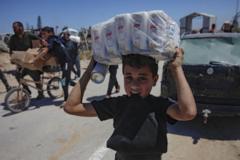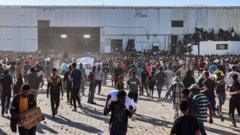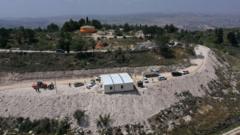Amid escalating tensions between Israel and Palestinian groups, a new humanitarian aid system has sparked criticism from the U.N., as it faces backlash from European and U.S. officials. Reports of civilian casualties during aid distribution further illuminate the growing crisis in Gaza.
Humanitarian Crisis in Gaza: Tensions Escalate Amid Aid Conflicts

Humanitarian Crisis in Gaza: Tensions Escalate Amid Aid Conflicts
The U.N. criticizes Israel's control over humanitarian aid delivery in Gaza, raising alarms about civilian safety and potential displacement.
The humanitarian situation in Gaza continues to deteriorate, with escalating criticism directed at Israel over its handling of aid deliveries. The U.N. recently denounced what it described as "an assault on their human dignity," in reference to Israel's efforts to control humanitarian assistance to Palestinians. This action follows more than two months in which aid was largely withheld from Gaza, with Israeli officials asserting that the new system is designed to prevent Hamas from monopolizing food supplies.
Reports from the U.N. World Food Program indicate that chaos erupted as crowds stormed a food warehouse in central Gaza, resulting in at least two fatalities. The situation escalated further when, on the first day of Israel's newly implemented aid program, numerous individuals were injured during similar rushes at distribution sites.
European diplomats have amplified their criticism of Israel, particularly regarding the stated threat of a major ground invasion in the region. Kaja Kallas, the E.U.'s chief diplomat, condemned the "disproportionate use of force" and emphasized that civilian casualties are unacceptable. She also insisted that the provision of aid should never be politicized or used as a military tool.
As the U.N.'s concern grows, it remains steadfast in its warning that the new aid distribution system, which replaces a previous one managed by U.N. agencies, raises significant risks for Palestinian civilians. Critics, including U.N. officials, argue that this shift could compel more civilians to walk long distances to limited aid locations, further endangering their safety and undermining essential support.
In the backdrop of these developments, the U.S. has reportedly reinforced its call for a truce, with White House envoy Steve Witkoff expressing cautious optimism regarding a potential cease-fire proposal. As discussions continue, the humanitarian crisis in Gaza remains a focal point of international concern, underscoring the challenges of securing aid while navigating longstanding geopolitical tensions.





















